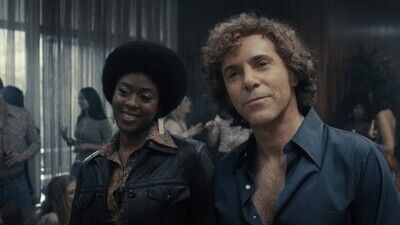André Holland brings his signature magnetism and depth to his prickly portrayal of the conflicted activist Huey P. Newton, whose constant harassment by the U.S. Government has affected not only his work but also his personal life. The always intriguing Alessandro Nivola walks the fine line between comedy and tragedy with his take on the passionate but often unreliable Schneider, whose commitment to the cause becomes affected by his various addictions.
Nivola spoke to RogerEbert.com over Zoom about developing television projects with a cinematic flair, how Warren Beatty in “Shampoo” shaped his performance, and the uneasy marriage of privilege and activism.
This interview has been edited for clarity.

In the past, we’ve talked a lot about how you usually look for a director you want to work with for your film projects. With television, there are often a lot more directors involved, although there’s usually a showrunner or some main creative force. In the case of “The Big Cigar,” you’ve got Don Cheadle directing several episodes and a story developed by Jim Hecht. What are you looking for with the television projects you’ve participated in?
Emily [Mortimer], my wife, and I have a production company. We’re developing television and have a deal at Sony. A big part of the way that we are developing television is around filmmakers. We want as much as possible to try to make the filmmaker the central focus of the development process. Obviously, once you get into filming, if it’s an ongoing or long-running series, it’s impossible to have one single director. Still, I feel like if a director can be involved in the development process as much as possible, there’s a better chance that the show will have a particular style. A look and feel and rhythm to it that hopefully then can be continued as other directors come in.
With something as short as “The Big Cigar,” it’s not unthinkable for a single director to do a six-episode series, but it’s still not that common. In this case, the scripts had a very specific tone and style. That was apparent on the page. Just from reading it, it was clear that there was a kind of marriage of something that had an absurdist element to it, with an undercurrent of something a lot more upsetting and relevant to the current moment.
Jim Hecht had done “Winning Time,” so I knew that this had a little bit of that element, but here, it was applied to a completely different world with different stakes. So, just from reading it, it was clear that it was going to have a particular visual style that was all its own and that didn’t feel like a lot of other television.

